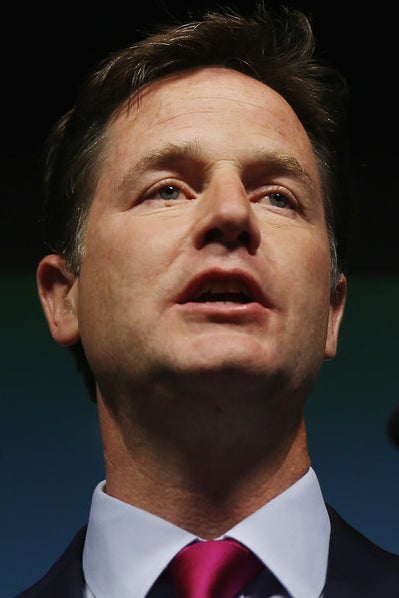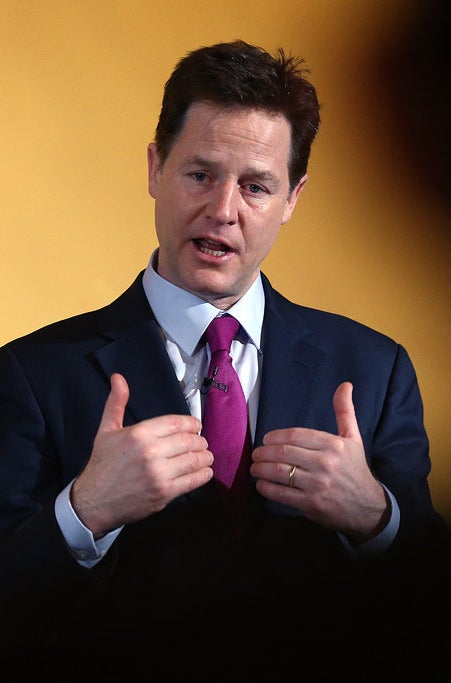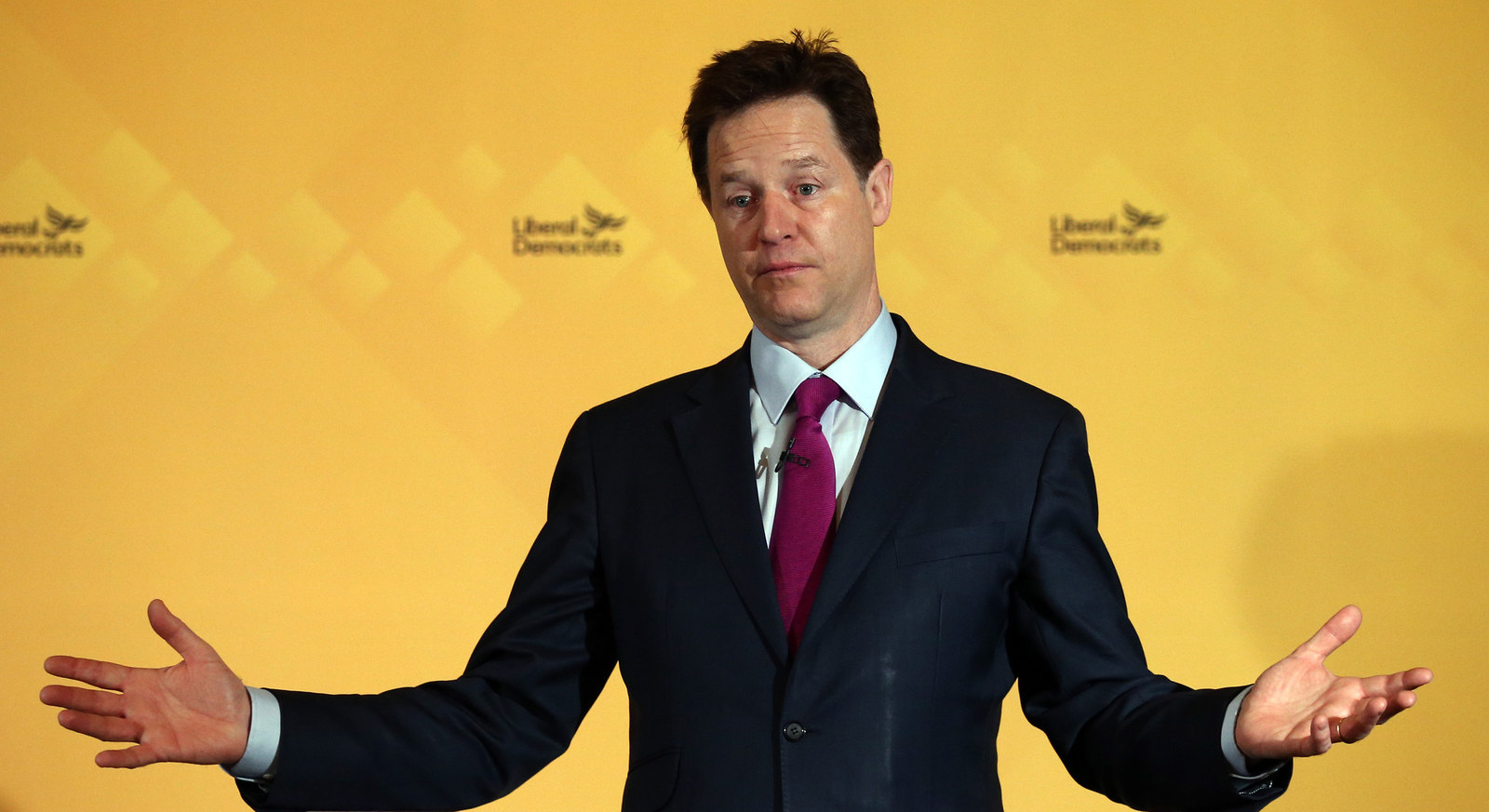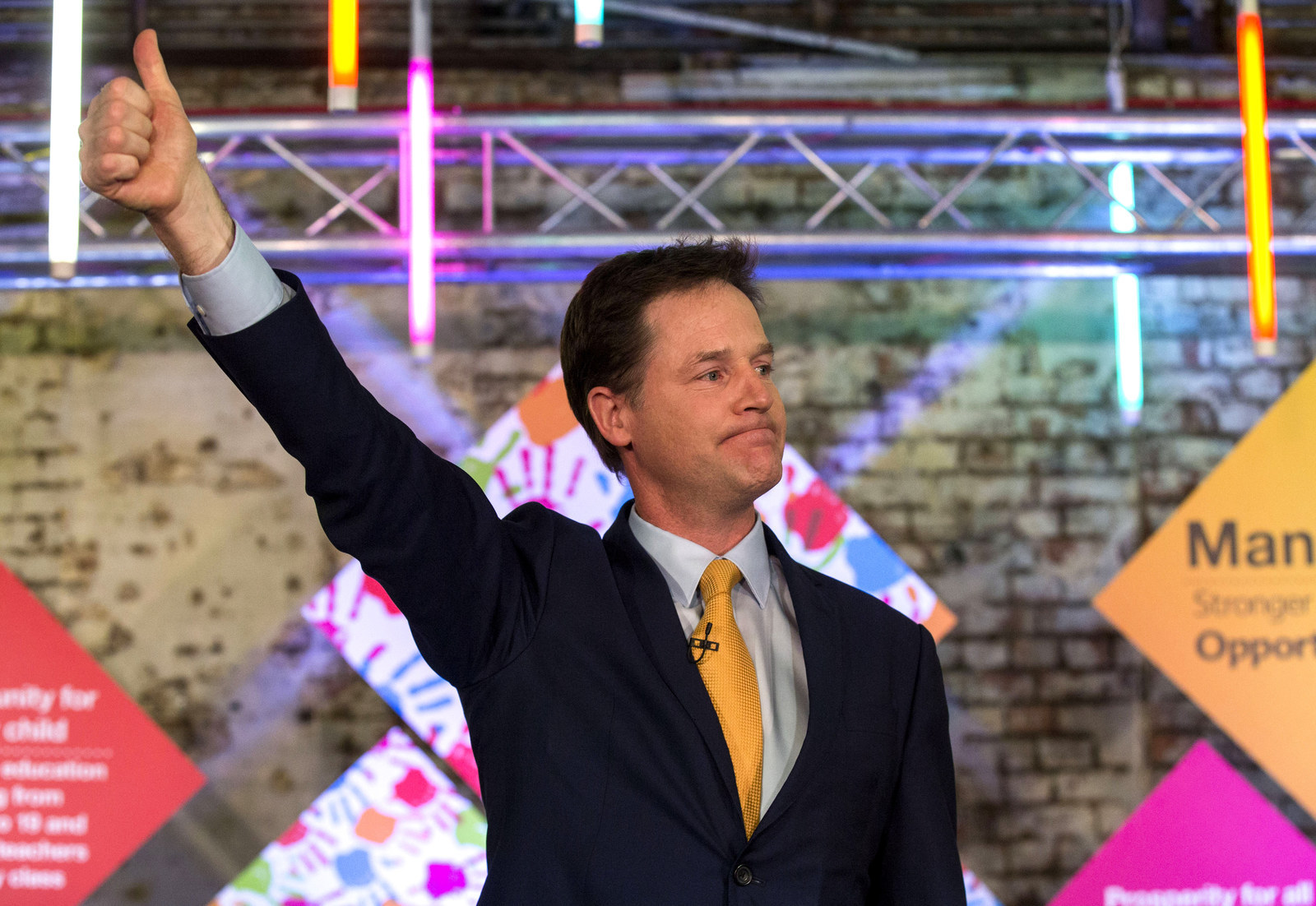Sitting in the back of the Liberal Democrat battlebus as it trundles along a dual carriageway through Dorset, Nick Clegg is strangely upbeat for the leader of a party on track to lose half of its MPs in just a few weeks' time.
The deputy prime minister looks exhausted around the eyes, and seems drained following several days of non-stop travel around marginal constituencies. But he's also having fun: In the first two weeks of the campaign he's been to hedgehog sanctuaries, met Joey Essex, and took a campaign break with journalists and staff to go zipwiring through a forest.
"Did you see my perfect landings?" he asks BuzzFeed News. "All three of them. I think that says something quite significant. I can't quite work out what it is."
Clegg comes across as the sort of dad who'd get stuck in at the barbecue, possibly wearing a comedy apron before playing some football with the kids. In short, as someone who might seem better suited to a life outside of Westminster. But he pushes back against this kind of psychoanalysis.
"For as long as I can remember people have been saying, 'Ooh, he looks sad,'" he says. "I'm constantly reading about what I'm supposed to think and feel."
Still, time and time again, Clegg says he's desperate to get away from politics, making constant references to how his friends don't work in Westminster, and how it's just the day job.
He insists he reads novels rather than keeping up with the evening news. He half-quotes W.H. Auden when attempting to sum up his approach to blocking unsavoury content online, saying that "private faces in public spaces are better than public faces in private spaces".


And he's probably most animated when talking about how he tracked down secret Prince gigs while studying in Minneapolis in the early 1990s.
"I saw [Prince] recently at Koko a month or two ago and it was the first time I'd seen him for 25 years," he says. "The amazing thing is that he's barely changed. The clothes, the energy. It was so, so thrilling to see him again.
"When I was in Minneapolis, it was completely extraordinary, because before he went on world tours he'd leave Paisley Park [Prince's studios] and go to little clubs, and the trick if you were a Prince fan was to guess where he might go.
"I remember there was a phase when he was about to go on a world tour and my flatmate and I would go from one bar to another. There was one bar we left at 1am, and he turned up half an hour later to play to 15 people."
And his favourite Prince song? "I've always liked 'When Doves Cry'. Very sparse."
But there's no time to dwell on such memories: He's got a campaign to fight, which he describes as a chance to talk "without Paul Dacre constantly saying what I'm supposed to think".
And on that score, he understands that people might be mistrustful of him.
"What I accept – and that's a fact – is that the left have wanted to portray the Liberal Democrats, and therefore me, as quislings who have sold their soul and principles," he says. "Then the right have wanted to portray us as sly and Machiavellian types who are depriving the Conservatives of their birthright to run this country."


The Lib Dems are haunted most by their 2010 manifesto pledge to abolish tuition fees. Instead, they allowed them to be raised to £9,000 a year.
Despite his earlier (and much-mocked) apology for the U-turn, Clegg is willing now to defend the policy – and even to promote it as a success, on the grounds that it has not slowed the rise in poor students going to university.
"Notwithstanding the political embarrassment, it's been much more successful than the critics at the time said," he insists. "It's fantastic news that more BME kids are going to uni than before, a higher proportion of poor kids than before.
"I understand that people in their own memories think that in 2010 we put tuition fees on the front of our manifesto – we didn't. They might think I talked about it every day – I didn't. There's no point in challenging that the way people remember or re-remember things is up to them, but it doesn't actually conform to reality."
Was it hard to take the surge of popularity of Cleggmania, when the Lib Dems briefly led the national polls during the 2010 campaign, and the sudden crash that came with going into government and seeing his support plummet? He pauses. "I'm not going to pretend to you that I'd seek out being vilified."

By joining the Tory-led government, the Lib Dems lost swathes of left-wing supporters, former Labour types who had drifted to Clegg's party in the Blair/Brown years. Clegg suggests that a lot of those voters don't understand the true nature of Ed Miliband's party: "You have very few Lib Dems from the north who have any romantic notions about Labour. Metropolitan Labour in the north is a nasty animal; they are brutal, unscrupulous, and have all the arrogance of southern Tories who think they've got a god-given right to run things."
Instead of tuition fees, this time the party is focusing on mental health and drugs reform. Clegg says the drive on mental health issues did not stem from anyone close to him, but that "institutionalised discrimination against people with mental health issues" is something that has come up in constituency surgeries.
"Shortly after I was first elected in Sheffield Hallam, the parents of a girl that had just turned 18 and suffered from anorexia were in floods of tears in my office," he recalls. "It was so, so moving to hear what had happened to this girl as she moved from being treated as a child to being treated as an adult; it was Dickensian.
"In 20 years' time we'll look back and ask what were we doing. In effect we're warehousing large numbers of people with mental health or drug addiction problems, shunting them aside out of public view. It's so irrational, unfair, inhumane."
He's not convinced by full legalisation of drugs ("You sound like Russell Brand … No country anywhere has proven it works"), but he does want to stop locking people up for possession and start treating it as a health issue: "I've lost count of the number of Labour and Tory politicians who say privately that we're right. It's not even the papers [holding back reform] any more; even The Sun is a major advocate of drugs reform.
"I genuinely think the British public are so far ahead of the political elite in terms of drugs reform. Even if you asked an elderly couple here in beautiful sunny Dorset, they will probably know someone: a friend, a niece, a nephew who has had drug problems."


As for future coalitions, he wouldn't step down as leader in order to allow a Lib Dem-Labour deal – but he stands by the principle that the party with the most MPs should have first dibs at forming a government.
Yet this is still a man facing the loss of dozens of MPs, who's even pulling resources from seats the party currently holds: "What you know is that centrally, because we don't have infinite budgets like the Tories, we are being ruthless in terms of where we target those resources. But we haven't completely abandoned them. Internally our ambitions on a good day are so far in excess of what people predict."
Still, Clegg keeps coming back to his interests outside of politics. At university he played "a singularly insignificant part" in a play directed by Sam Mendes, whom he's kept in touch with. And he went to school with Gwen Stefani's husband, Gavin Rossdale, and Helena Bonham Carter.
He pauses. "All these people and I'm sitting on a bus. But I'm so, so chuffed with what I've been allowed to do. Like everything in life, I know I'm not going to do it forever, so I just enjoy it."


